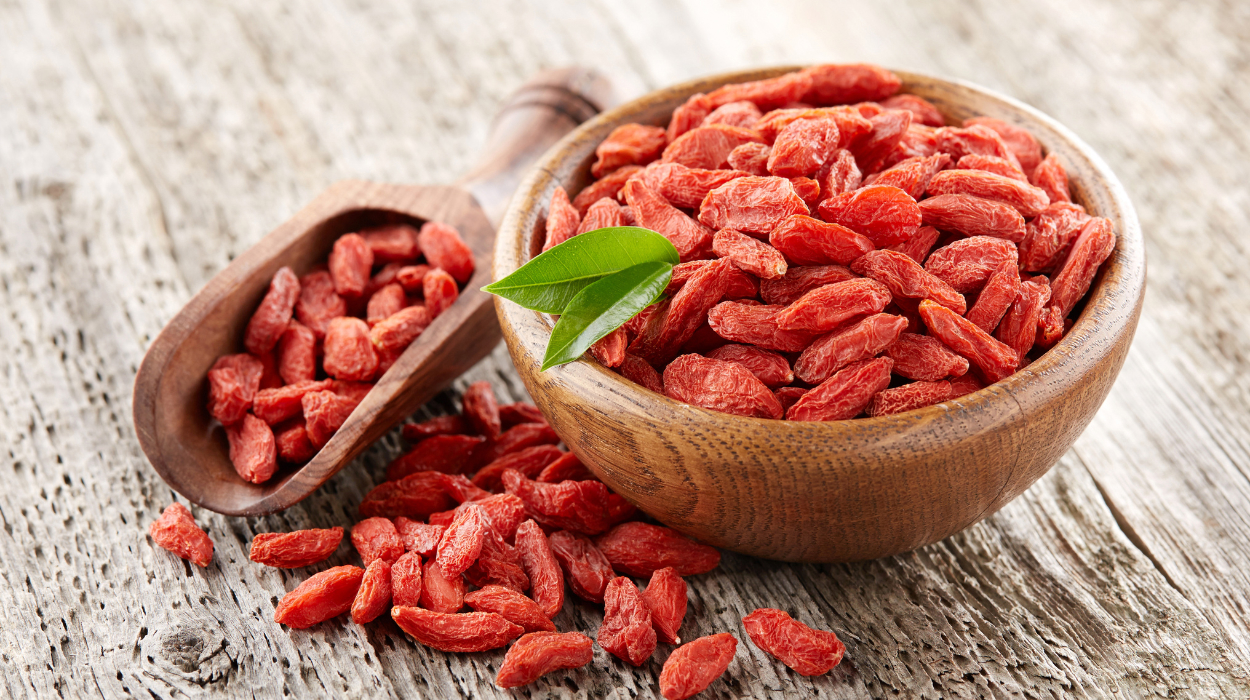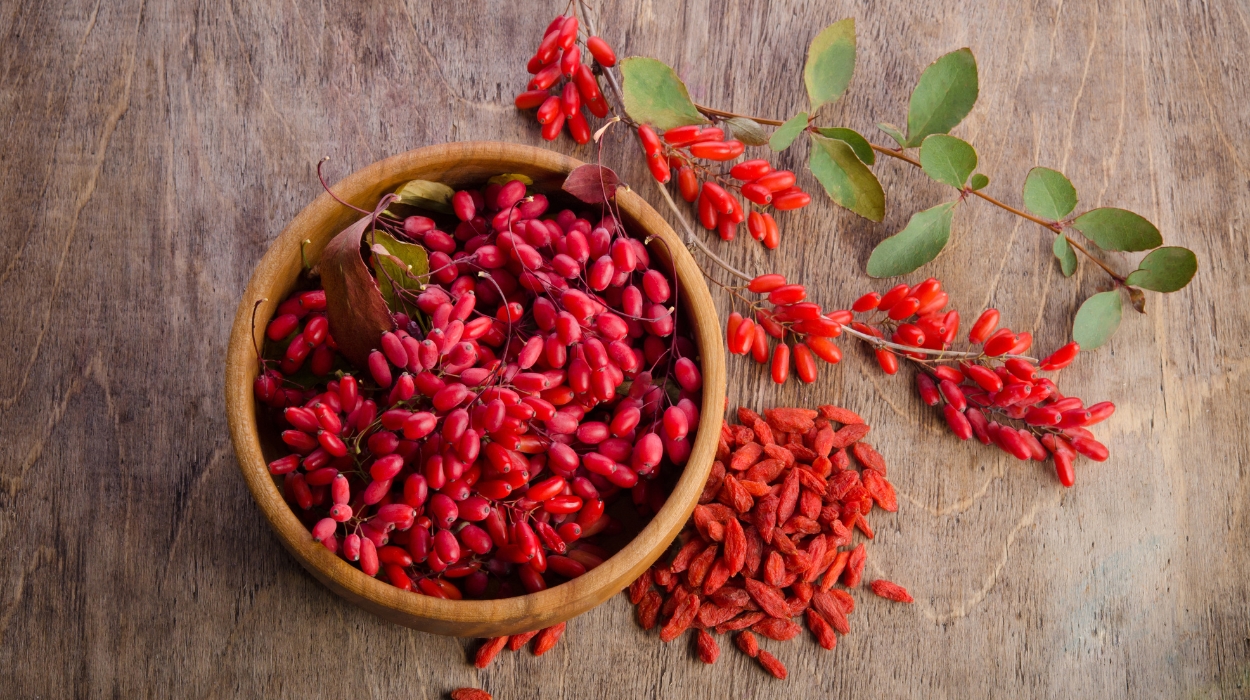Goji berries are more than just a treat for the taste buds. They’ve been celebrated for centuries in traditional Chinese medicine. The health advantages of goji berries are impressive.
Packed with antioxidants, vitamins, and minerals, goji berries contribute to your overall well-being. From their uses in cooking to the wealth of nutritional facts they offer, let’s dive into a comprehensive review of these berries’ benefits.
Read on to discover their uses, nutritional value, and the potential side effects of this vibrant orange-red fruit. We’ll discuss both the goji berry benefits and possible negative issues.
What Are The Health Benefits Of Goji Berries?
Goji berries offer health-protective benefits, including:
- Improved eye health.
- Cancer protection.
- Improved sleep and mental health.
- Liver damage protection.
- Immune system support.
- Weight loss benefits.
- Improved testosterone levels.
- Blood sugar maintenance.
- Improved skin health.
Amazing Health Benefits Of Goji Berries

The range of goji berry fruit benefits is diverse, from improving immune function to promoting healthy skin. Here are the most significant advantages of consuming goji berries:
Improved Eye Health
Goji berries are believed to improve eye health and protect the eyes[1] against several causes of blindness among older people. The high antioxidants in these berries, particularly zeaxanthin,[2] help enhance the pigment in the retina, which protects against blue light and sunlight damage.
Research suggests that drinking goji berry juice increases antioxidant and zeaxanthin levels in the body. Those who drank goji berry juice had a lower instance of glaucoma,[3] diabetic retinopathy,[4] and other eye diseases.
Cancer Protection
Goji berry nutrients include vitamin C, zeaxanthin, and carotenoids, which may play a role in battling cancer cells. These antioxidants prevent tumor growth, reduce inflammation, and help eliminate harmful substances from the body.
Research shows that goji berries may slow tumor growth. It also suggests goji berries may help improve the efficacy of cancer treatments[3] and reduce the side effects[5] of other cancer therapies.
Improved Sleep And Mental Health
Goji berries may also help improve sleep. A study on rats revealed that goji berries can alleviate anxiety-like behaviors[6] and symptoms of depression.
Older studies in humans showed that drinking goji berry juice daily increases subjective feelings of general well-being and improves energy,[7] mood, and digestive health. Participants who consumed goji berry juice for 14 days reported improved well-being, mental acuity, and better sleep quality. No adverse effects were reported in this study.
Liver Damage Protection
In traditional Chinese medicine, goji berries are used to treat liver disease. Research suggests that consuming goji berries may help manage liver health[3] and prevent the progression of alcohol-induced fatty liver diseases by protecting the liver from injuries due to exposure to toxic chemicals. Additionally, goji berries may potentially slow tumor growth of liver cancer cells.
Immune System Support
Goji berries are rich in immune-boosting antioxidants[8] known for combating free radicals and inflammation. They are also rich in vitamins A and C, crucial in fortifying immunity and guarding against illnesses from the common cold to cancer.
Preliminary lab tests indicate that wolfberry goji berry benefits may enhance flu vaccine effectiveness, potentially preventing subsequent infections.[9] While goji berries aren’t a substitute for the flu vaccine, they may offer added immune support for more thorough flu protection.
Weight Loss Benefits
Goji berries provide a nutritious burst of energy in small servings. Their sweet flavor and high-fiber content make them an excellent fruit for weight loss. Snacking on goji berries provides a healthy yet satisfying snack, which can help curb overeating at meals.
You can incorporate these berries into yogurt or salads for a tasty alternative to higher-sugar dried fruits. With approximately 110 calories per 30 grams,[10] goji berries’ nutritional value is low in calories and sugar. While they won’t help you lose weight directly, they are a healthy addition to a balanced diet and exercise routine.
While goji berry supplements aren’t considered diet pills, studies show goji berry extracts reduce abdominal fat and improve lipid profiles in people with metabolic syndrome,[11] a combination of conditions that together increase the risk of heart disease, stroke, and type 2 diabetes.
Improved Testosterone
Goji berries also affect sexual performance and fertility. A study in rats revealed substantial improvements in fertility,[12] including increased sperm quantity and movement, enhanced sexual ability, and shortened response times.
Additionally, goji berries aid in maintaining testosterone levels. Research in animals suggests that goji berries may be an effective alternative to prescription medications for erectile dysfunction in humans, improving sexual health and hormonal balance.
Blood Sugar Maintenance
Goji berries may also offer benefits for blood sugar maintenance.[13] Despite their sweet flavor, they offer potential benefits of lowering blood sugar, improving sugar tolerance, alleviating insulin resistance, and supporting insulin-producing cells.
Studies show that goji berries help balance insulin and blood glucose levels, improving HDL cholesterol in people with type 2 diabetes. Still, prior consultation with your doctor is advised, especially if you are on blood sugar medications. Regular consumption may require more frequent blood sugar monitoring to determine your response.
Improved Skin Health
Goji berries are rich in beta-carotene,[8] a phytochemical promoting healthy skin. This compound is commonly used in skin creams to improve skin health, reduce irritation, and address the effects of sun exposure[8] and aging.
A study in mice[14] showed that consuming five percent goji juice provided sufficient antioxidants to protect[15] against UV light damage and skin disorders. Antioxidants play a protective role against environmental factors such as radiation and smoke. Since goji berries are rich in these antioxidants, regular consumption can contribute to improved skin health.
Goji Berries Information And Facts
A rich source of vitamins[10] and minerals, goji berries are high in vitamin C, fiber, iron, Vitamin A, zinc, and several antioxidants. Goji berries contain all eight essential amino acids, including 13%[8] of your daily protein value.
The elevated fiber and complex carbs in these berries contribute to a slower increase in blood sugar levels, which prevents the risk of a sugar crash. Phytochemicals, or plant-produced compounds, in goji berries, give them their status as a superfood.
These healthy berries are high in polysaccharides, essential dietary fiber sources[15] that improve immune function and overall antioxidant activity. Beta-cerotene in goji berries is responsible for their orange-red pigment and contributes to bone, eye, and skin health. They rank amongst the fruits highest in beta-carotene content.
Zeaxanthin is another vital component of these berries that supports the immune system. It is also believed to prevent macular degeneration,[16] a progressive vision impairment affecting the central retina.
Several studies suggest that regular consumption of goji berries is linked to improved health and well-being.
How To Use Goji Berries

Many health food stores and supermarkets offer dried goji berries for sale. They come prepackaged, in bulk, and fresh. Most people treat goji berries like raisins or other berries. You can mix them in cereal, yogurt, or trail mix, or them as juice or goji berry tea.
Goji berries can also be incorporated into savory dishes like lean pork or turkey to add sweetness to your food. The vitamin C in these berries also improves iron absorption from various meats.
They can also be mixed into smoothies with other fruits for enhanced nutrition. Add your favorite greens powder or fruit and vegetable supplements to boost health benefits.
Aim for at least two servings of fruit a day for optimal health. Be sure to purchase dried goji berries from a reputable source to avoid the sulfite content from cheaper or imported brands.
Risks And Side Effects Of Goji Berries To Watch Out For
As with any time you introduce a new food into your diet, goji side effects[15] are possible. While generally safe, some people should consult their healthcare provider before adding goji berries to their diet. Here are some tips to help you avoid common risks and goji berry effects:
- Goji berries may interact with certain medications. People taking blood thinners, type 2 diabetes drugs, and high blood pressure medications should consult their doctor before eating them.
- Some people may be allergic to the berries. If you have allergies to other fruits or berries, talk to your doctor to prevent potential allergic reactions before consuming.
- There is limited evidence from animal studies[17] on the safety of goji berries during pregnancy. Pregnant people are advised to err on the side of caution and avoid goji berries for potential concerns of uterine contractions.
- One-fourth cup of goji berries fulfills 340% of the daily recommended intake of vitamin A. Be cautious to stay within this limit. You may run the risk of vitamin A toxicity with overconsumption.
- Some evidence shows that goji berries may be contaminated[18] with pesticides and metals during the plantation process.
Conclusion
Goji berries offer several potential health benefits, from bolstering immune function to promoting skin health. Still, caution is advised, especially for people on medications, pregnant individuals, and those with allergies. Consult with a healthcare professional to ensure safe integration into your diet.
With the right approach, you can enjoy the benefits of goji berries and take advantage of this powerful and nutritious fruit.
Frequently Asked Questions
While goji berries contain natural sugars, they are considered low in sugar compared to many other fruits. Their inherent sweetness is balanced by their nutritional value, making them a healthy addition to your diet in moderation.
Consuming around a handful of goji berries daily is a suitable guideline for optimal benefits. This provides essential nutrients without excess, bringing a balanced approach to taking advantage of the nutritional benefits of these berries.
Goji berries make a versatile snack you can enjoy anytime. Incorporating them into breakfast, salads, or yogurt bowls can improve your morning routine. Their natural sweetness complements dishes and gives you a nutritious boost from breakfast to dinner.
Goji berries retain their maximum nutritional benefits when eaten raw or dried. Incorporate them into smoothies, salads, or trail mixes for a nutrient-rich addition to your diet.
While goji berries offer numerous health benefits, disadvantages include allergic reactions and interactions with certain medications for some people. Additionally, excessive consumption may lead to digestive discomfort.
Goji seeds offer various benefits because they contain essential nutrients, antioxidants, and amino acids. They contribute to overall well-being, supporting immune function, improving skin health, and providing nutritious support to your diet.
 Evidence Based
Evidence Based
